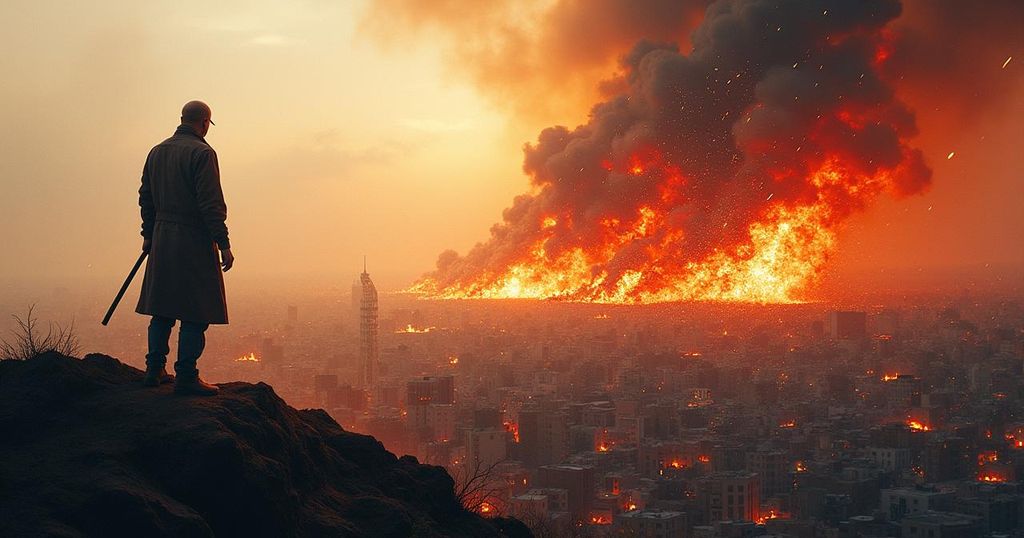Guterres Urges Immediate Ceasefire Amid Middle East Escalation
Amid escalating conflicts in the Middle East, UN Secretary-General António Guterres condemned the ongoing violence, calling for an immediate ceasefire. Iran launched missiles at Israel, coinciding with Israeli ground incursions into Lebanon, heightening tensions that connect to the ongoing Gaza war. Recent Israeli airstrikes in Yemen underscore the region’s complexity, with critical humanitarian ports still operational despite threats.
On Tuesday, as violent conflicts intensified in the Middle East, UN Secretary-General António Guterres made a strong appeal for immediate cessation of hostilities. In a succinct statement, he expressed his condemnation of the ongoing conflict, stating, “I condemn the broadening of the Middle East conflict, with escalation after escalation. This must stop. We absolutely need a ceasefire.” The escalation of violence included Iran launching a series of ballistic missiles towards Israel, coinciding with Israel’s reported “limited” ground incursion into southern Lebanon. Fortunately, initial reports indicated that no injuries occurred on the Israeli side, and military sources confirmed that approximately 180 missiles were fired, many of which were successfully intercepted. The uptick in cross-border skirmishes between Israeli forces and Hezbollah militants has arisen in the context of the ongoing Gaza war, which has now entered its second year. Recently, Israeli airstrikes targeted the southern suburbs of Beirut, resulting in the demise of Hezbollah leader Hassan Nasrallah. Historically, hostilities between Israel and Hezbollah date back nearly two decades, prompting a UN Security Council resolution, 1701 (2006), aiming to halt the 34-day conflict and enhance the UN Interim Force in Lebanon’s (UNIFIL) operational capacity. In another significant development, Israeli airstrikes on Yemen were reported to have occurred following missile attacks launched by Houthi rebels aimed at Israeli cities. These airstrikes targeted the crucial port city of Hudaydah, which is essential for humanitarian assistance to Yemen. Despite recent tensions, UN reports indicated that both the Hudaydah and Ras Issa ports remain operational for receiving humanitarian supplies, although power supply in Hudaydah is critically limited. During a media engagement, Israeli Ambassador Danny Danon addressed the Iranian missile attack, emphasizing Israel’s preparedness amidst escalating threats.
The ongoing instability in the Middle East has seen a significant escalation in conflicts involving Israel and various regional actors, including Iran and Hezbollah. The resurgence of hostilities is intertwined with the broader context of the Gaza war, which has drawn in multiple factions and countries, escalating tensions that have long plagued the region. Israeli airstrikes, combined with retaliatory missile launches from adversarial groups like the Houthis in Yemen, represent a widening of the conflict, raising international concerns regarding human security and geopolitical stability. Previous UN resolutions aimed at mitigating such conflicts highlight the urgent need for renewed diplomatic efforts to achieve lasting peace.
In summary, the situation in the Middle East continues to deteriorate with increasing hostilities and complex geopolitical tensions. UN Secretary-General António Guterres has called for an immediate ceasefire amidst the ongoing violence involving multiple regional players, including Iran and Hezbollah. The humanitarian implications are profound, particularly in Yemen, where critical ports remain operational despite assaults. As the international community watches closely, the potential for further escalation underscores the urgent necessity for diplomatic interventions to restore peace and security in the region.
Original Source: news.un.org




Post Comment